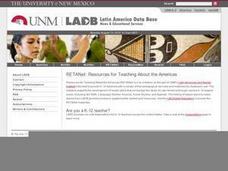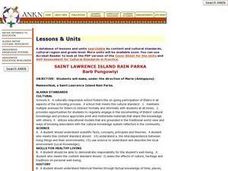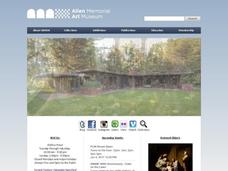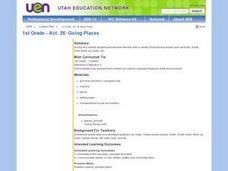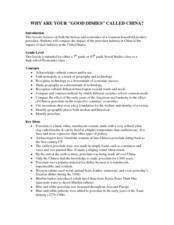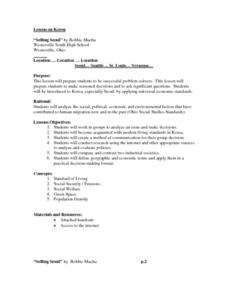Curated OER
Sectors? What Sectors?
Middle schoolers develop a list why water is an endangered natural resource. They identify four sectors in society. They explain the responsibilities that each sector plays in conserving water.
Curated OER
Urbanization in the Amazon Basin: Can Indigenous People Survive?
Students investigate the relationship between economic development and social change of indigenous peoples.
Curated OER
Wolf Pack in a Bottle
Students participate in an activity of a mock electrophoresis using paper chromatography to study DNA and genetic restriction mapping.
Curated OER
It's All Relative
Students find pictures of living things and arrange them in collages, categorizing them according to which they think are more closely related to which.
Curated OER
Saint Lawrence Island Rain Parka
Pupils make a Saint Lawrence Island Rain Parka after researching walrus life.
Curated OER
Kansas River: Where Do They Come From? Where Do They Flow? Which Ones Make the Kansas River Grow?
Students identify major rivers in Kansas, identify the direction which they flow and identify tributaries of the Kansas River. Students examine what occurrences upstream influence water quality downstream.
Curated OER
A Nation in (Some) Context
Eleventh graders view selected websites to gain information about Puerto Rico and think about its relevance to Rafael Ferrer's "12 Variations on An 18th-century Map of Puerto Rico".
Curated OER
Chinese New Year: Paper Lanterns
First graders study the celebrations of Chinese New Year. They practice measuring and cutting to make paper lanterns.
Curated OER
Language Arts: Five Senses Walk
First graders take a discovery walk around the school. They use their observations to compose a class book about their school.
Curated OER
Environment: Going Places
First graders learn directional words and apply this skill to map making. They record their steps on paper.
Curated OER
"how To Think Like an Archaeologist" Suggested Pre-visit Activity for Historic Jamestowne
Students study grocery receipts to simulate the archaeological activity of classifying items. They discuss the receipts as if they were find lists.
Curated OER
New England News: All You Need to Know About the New England Colonies
Students explore the New England colonies inj this five lessons unit. The colonies of plymouth Rock, Massachusetts, Rhode Island, New Hampshire, and Connecticut are highlighted through a variety of techniques.
Curated OER
Land of the Rising Sun
Students survey aspects of traditional and modern Japanese customs and beliefs in the seven lessons of this unit. Both the culture and the geography of the country are studied in this unit.
Curated OER
Four Ancient River Civilizations
Students explore how the environment shapes man, how man transformed his world, nd how art became part of the human process. The group is divided into clans and their migratory routes developed in the eight lessons of this unit.
Curated OER
Invaders and Settlers
Students watch a video that illustrates the way in which an English community evolved based on geography and the settlers and invaders who lived there over different time periods. They create a map that shows how different villages are...
Curated OER
Birds of A Feather
Students observe and record the many types of birds they see in a month. They discover the many patterns birds follow and compare their results with other classrooms. They complete a field assessment as the final activity for this lesson.
Curated OER
Hispanic, Latino - What's the Right Word? an Examination of the Language Used To Categorize People
Students define "Hispanic" and "Latino," analyze where these terms come from, and develop an awareness of racial labels.
Curated OER
Geography: Snow Cover on the Continents
Students create maps of snow cover for each continent by conducting Internet research. After estimating the percentage of continental snow cover, they present their findings in letters, brochures or Powerpoint presentations.
Curated OER
Sea Surface Temperature Trends of the Gulf Stream
Learners use authentic satellite data to produce plots and graphs of sea surface temperature as they explore the seasonal changes of the Gulf Stream.
Curated OER
The Clothing of the Buddha
Young scholars discuss the idea of cultural diffusion by examining how the sculptural portrayal of the Buddha's clothing evolved in Japanese and Chinese art. This activity concludes with a group project and presentation.
Curated OER
Why Are Your "Good Dishes" Called China?
Students link monopoly as a result of geography and technology. They recognize technology as a determinant of economic success. Students recognize cultural diffusion based upon societal wants and needs. They compare and contrast methods...
Curated OER
"Selling Seoul"
Learners research the economy of Korea and work in a small group in order to reach decisions about aspects of the information found. They conduct class discussion about how people live in Korea and what is considered an acceptable...
Curated OER
Location of Cities 201
Students work in pairs to locate the ancient cities on a world atlas using the longitude and latitude measurements. They examine the physical and human futures that explain their locations.



